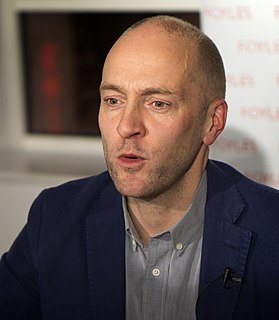A Quote by Leo Tolstoy
How important the concept of God is, and how instead of valuing what has been given us, we with light hearts spurn it because of absurdities that have been attached to it.
Related Quotes
Freud taught us that it wasn't God that imposed judgment on us and made us feel guilty when we stepped out of line. Instead, it was the superego - that idealized concept of what a good person is supposed to be and do - given to us by our parents, that condemned us for what had been hitherto regarded as ungodly behavior.
None of us like the concept of law because none of us like the restraints it puts on us. But when we understand that God has given us his law to aid us in guarding our souls, we see that the law is for our fulfillment, not for our limitation. The law reminds us that some things, some experiences, some relationships are sacred. When everything has been profaned, it is not just my freedom that has been lost- the loss is everyone's. God gave us the law to remind us of the sacredness of life, and our created legal systems only serve to remind us of the profane judgments we make.
Nothing like one honest look, one honest thought of Christ upon His cross. That tells us how much He has been through, how much He endured, how much He conquered, how much God loved us, who spared not His only begotten Son, but freely gave Him for us. Dare we doubt such a God? Dare we murmur against such a God?
Remembering that God is my source, we are in the spiritual position of having an unlimited bank account. Most of us never consider how powerful the creator really is. Instead, we draw limited amounts of the power available to us. We decide how powerful God is for us. We unconsciously set a limit on how much God can give us or help us. We are stingy with ourselves. And if we receive a gift beyond our imagining, we often send it back.
Do any of us, except in our dreams, truly expect to be reunited with our hearts' deepest loves, even when they leave us only for minutes, and on the most mundane of errands? No, not at all. Each time they go from our sight we in our secret hearts count them as dead. Having been given so much, we reason, how could we expect not to be brought as low as Lucifer for the staggering presumption of our love?
No matter what we have come through, or how many perils we have safely passed, or how many imperfect and jagged - in some places perhaps irreparably - our life has been, we cannot in our heart of hearts imagine how it could have been different. As we look back on it, it slips in behind us in orderly array, and, with all its mistakes, acquires a sort of eternal fitness, and even, at times, of poetic glamour.
God gave us minds to think with and hearts to thank with. Instead we use our hearts to think about the world as we would like it to have been, and we use our minds to come up with rationalizations for our ingratitude. We are a murmuring, discontented, unhappy, ungrateful people. And because we think we want salvation from our discontents.
I once heard somebody say that God had closed a door on an opportunity they had hoped for. But I've always wondered if when we want to do something that we know is right and good, God places that desire deep in our hearts because He wants it for us and it honors Him. Maybe there are times when we think a door has been closed and, instead of misinterpreting the circumstances, God wants us to kick it down. Or perhaps just sit outside of it long enough until somebody tells us we can come in.





































